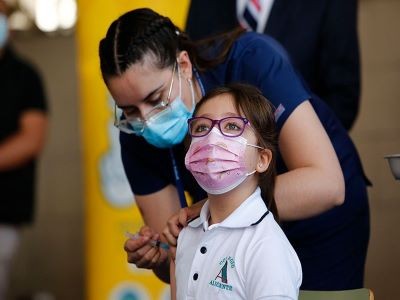Health-care workers who got the influenza vaccine were also protected from COVID-19 — but the effect might not last long.
By Ewen Callaway, 16 May 2022
Influenza vaccines have a surprising health benefit: they might also prevent COVID-19, particularly in its most severe forms1.
A study of more than 30,000 health-care workers in Qatar found that those who got a flu jab were nearly 90% less likely to develop severe COVID-19 over the next few months, compared with those who hadn’t been recently vaccinated against flu.
The study, which was conducted in late 2020, before the roll-out of COVID-19 vaccines, is in line with previous work suggesting that ramping up the immune system using influenza vaccines and other jabs could help the body to fend off the coronavirus SARS-CoV-2.
Collateral benefit
In the early months of the pandemic — while COVID-19 vaccines were still in development — researchers were intensely interested in the possibility that existing vaccines might provide some protection against SARS-CoV-2. But collecting strong evidence for such an effect is difficult, because people who seek vaccination for diseases other than COVID-19 might also make other choices that reduce their risk of being infected with SARS-CoV-2.
To minimize the impact of this ‘healthy-user effect’, a team led by Laith Jamal Abu-Raddad, an infectious-disease epidemiologist at Weill Cornell Medicine–Qatar in Doha, analysed the health records of 30,774 medical workers in the country. There is probably less variation in health-related behaviour among such workers than in the general population, reducing — but probably not eliminating — bias, Abu-Raddad says.
The researchers tracked 518 workers who tested positive for SARS-CoV-2 and matched them to more than 2,000 study participants who had tested negative for the virus. Those who had received an influenza vaccine that season were 30% less likely to test positive for SARS-CoV-2, and 89% less likely to develop severe COVID-19, compared with workers who had not (although the number of severe cases was small in both groups). The study was posted on the medRxiv preprint server on 10 May.
Günther Fink, an epidemiologist at the University of Basel in Switzerland, says the Qatar analysis reduces the odds that other studies that uncovered the same link were a fluke. His team reported that flu vaccines were associated with a reduced risk of death in people hospitalized with COVID-19 in Brazil2.
“This is an important piece of evidence,” says Mihai Netea, an infectious-disease specialist at Radboud University Medical Center in Nijmegen, the Netherlands. The observation that influenza vaccines are linked to a reduction in not just SARS-CoV-2 infections, but also disease severity, strongly suggests that the protection is genuine, he adds.
Time limit
How long this protection lasts is unclear. Among those in the Qatar study who had the flu jab and later contracted COVID-19, Abu-Raddad’s team recorded SARS-CoV-2 infections occurring, on average, about six weeks after vaccination. “I don’t expect to see this effect lasting long at all,” he says. Netea guesses that the benefits last for between six months and two years.
It’s not fully clear why flu vaccines — which are composed of killed influenza viruses — would also protect against COVID-19. Vaccines train the immune system to recognize specific pathogens, but they also rev up broad-acting antiviral defences, says Netea, who has found signs of such responses in flu-vaccine recipients3.
Netea’s team is also working to better quantify the benefits of vaccines targeting influenza and other diseases against COVID-19. To fully rule out healthy-user effects, his team has launched a randomized, placebo-controlled trial in Brazil that will test whether influenza and measles–mumps–rubella vaccines can protect against COVID-19.
Knowing that vaccines for flu and other diseases can offer protection against COVID-19, even if only partial and for a limited period, could limit the damage caused by a future pandemic before a vaccine for that disease is developed, Netea argues. “If you have something in the beginning, you could save millions of lives.”
doi: https://doi.org/10.1038/d41586-022-01315-9
References
Tayar, E. et al. Preprint at medRxiv https://doi.org/10.1101/2022.05.09.22274802 (2022).
Fink, G. et al. BMJ Evid. Based Med. 26, 192–193 (2020).
Debisarun, P. A. et al. PLOS Pathog. 17, e1009928 (2021).
(Sources: Nature)














Đăng nhận xét